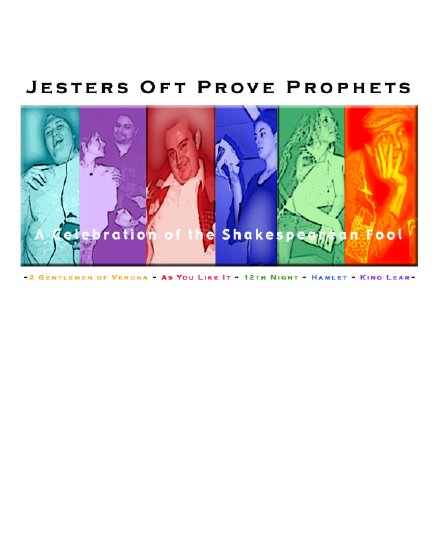
The Beginning of “Jesters”
In 1998 and 1999, members of the Junior Indiana Shakespeare Company, run by actress Julie Fether, discussed the possibility of a compiled script, a script wherein the words of Shakespeare could be rearranged and reinvented-- but remain true to the language. One idea was to use different dialogues from different plays, merging them to create a script. Another idea was to take five acts from five different plays (Shakespeare’s plays are always done in five acts) and arrange them into a single story. However, this task was impossible considering the motivations of different characters and the cause and effect which occurs in all of Shakespeare's plays.
“Jesters” emerged from the idea of linking scenes with a common theme: the Fool. When the Junior Company came to an end in 1999, Katherine Callison, a former company member, kept the idea on the back burner for later tweaking. She wanted to create an adventure for the Fool and an educational experience for the audience.
Callison wanted the Fool to be the main focus, and decided upon a series of scenes-- not full acts where other characters would distract from the Fool-- where the audience, perhaps unfamiliar with Shakespeare, would be led from one scene to the next by a host. The idea became not so just an endeavor to entertain, but one to educate. Callison wanted a show that would make the audience love Shakespeare and want to see more.
At Indiana University, Callison work-shopped her script, "Jesters Oft Prove Prophets" (the title comes from a line in "King Lear"), with students. At Ball State University in 2002, Callison shared the script with faculty at the BSU Department of Theatre and Dance. Professors, including Judy E. Yordon, gave suggestions to better accustom the script for an audience not familiar with Shakespeare. After many rewrites, Callison asked students at Ball State’s theatre department and members of the Muncie community if they would like to take part in her production. The company (nicknamed "A Company of Fools") also received the talent of composer Dr. Paul Geraci; his original music for the show included a Spanish-like rendition of "Come Away Death" and a rap version of "In Youth, When I Did Love."
The company faced many obstacles. The Ball State theatre department could not offer financial aid, and it was difficult to find rehearsal space adequate for the production. The most obvious challenge was learning the text and finding a way to make the show both educational and entertaining.
In March of 2003, the company received a $300 Creative Arts grant. March 29th, “Jesters” opened to a small crowd, mainly of encouraging parents, at the Muncie Center for the Arts. The company received larger audiences on campus, which consisted of students and community members. The most successful performance was held outdoors in front of Bracken Library on the Ball State campus. It was here that the Fools could perform the way Shakespeare intended; outside with the light of the sun and no barrier between them and the audience. Both audiences and company members thrilled at the chance to interact with one another. April 5th, 2003, “Jesters” closed their tour.
The Cast
The “Jesters” Goal
The script intends to educate audiences to create a better understanding of Shakespeare. The Fool is a great devise because he is a character used by Shakespeare to humor both the lower class and the upper class-- a universal tool for the general audience. His wisdom and sadness mixed with his songs and jokes give variety. He can make audiences cry as easily as he can make them laugh.
The script, "Jesters Oft Prove Prophets, is copyrighted, but is available through this site. The writer encourages the viewer to read the script and to even produce it, charge free, being that the production is non-profit or for donations to charity. To acquire the rights for use of the script, Katherine Callison can be contacted via email at kscallison@bsu.edu. To see an excerpt from the script, click here.
Links, For Things Foolesque in Nature
http://www.win.net/ashrun/fools
This site offers not only history and references about the fool, but also gives suggestions as to how to perform as a fool.
http://www2.kumc.edu/itc/staff/rknight/Fool.htm
This is a great site for history and references about the fool; click on "Links" for multiple motley possibilities!
http://web.uvic.ca/shakespeare/Library/SLTnoframes/society/fools.html
This site is the brief version of the two above. It also contains a little information on Will Kempe and Robert Armin, members of Shakespeare's original company who played as the fools.
http://www.thenoodlebowl.com/jesters/pages/literature.html
This site offers literature about the fool such as poems and stories.
http://www.jester.net/CourtJs.htm
This site gives some history not only about European fools, but also fools of Ancient China.